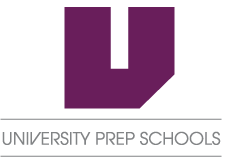THE UPA COMMUNITY
High School graduation and post-secondary education are the surest pathways to a stable and fulfilling life. At University Prep Academy, we believe that it is the responsibility of a great school district to partner with families, to provide students with everything they need to graduate and succeed in post-secondary education. We strongly believe that all students can succeed, given personalized education and a relentless commitment to their success. We have studied successful schools around the country and around the world, and have drawn upon their lessons to shape the University Prep model, a clear alternative to the mass produced, factory-based model of most urban schools.
OUR MODEL IS BASED ON THE FOLLOWING LEARNING PRINCIPLES:
THE UPSM COMMUNITY
Built on the foundation of its sister district, University Prep Academy, UPSM is driven by a belief that it is the responsibility of a great school district to partner with families to provide students with the tools they need to achieve success in post-secondary education. It is because of that belief that Excellent Schools Detroit ranks UPSM Middle School as the seventh highest performing middle school in the region—which includes the city of Detroit and the near ring suburbs. It is because of that belief that UPSM High School students are posting ACT/Explore and ACT/Plan scores between 15 and 16 in the 9th and 10th grades, which is comparable to what many other local schools post by a student’s 12th grade year.
OUR MODEL IS BASED ON THE FOLLOWING LEARNING PRINCIPLES:
The UPSM model is rooted in the belief that work habits and attitude matter. These are the habits of work and the habits of mind that we teach throughout the school community:
HABITS OF MIND (SPECS):
- Significance: Why is it important? Why should you care?
- Perspective: Who says? How do the author’s experiences influence the ideas presented? What prior knowledge am I bringing to the problem?
- Evidence: What argument is being made? What facts are used to support the argument? How do you know they are facts versus opinion?
- Connections: How does this work connect to the real world? How has it been influenced by the past? How could it affect the future?
- Supposition: How would life be different if this wasn’t true or never happened? What would happen if you changed part of the problem?
UPSM HABITS OF WORK (COSTS):
- COLLABORATION
- ORGANIZATION
- STICKTOITIVENESS
- TIME MANAGEMENT
- SELF-MONITORING
THE UPAD COMMUNITY
School Culture
UPAD: SCS students participate in daily forum activities because getting along well with others and cooperating and following established behavioral guidelines is so fundamental to a productive and positive learning experience.
This approach uses the following key strategies to develop social competence: daily routine, rule creation, interactive modeling; goal setting, positive teacher language, logical consequences, learning studio design that promotes independence and responsibility; working with families; and collaborative problem solving.
Restorative Practices: The use of Restorative Practices has been shown to be a highly effective way to build and maintain positive school culture that supports a safe, productive and high performing learning community for students and adults in school settings. This approach allows UPAD: SCS students to experience some of these important aspects of community: respect and safety; consideration and appreciation; encouragement and belonging; and, empathy and inclusion.

